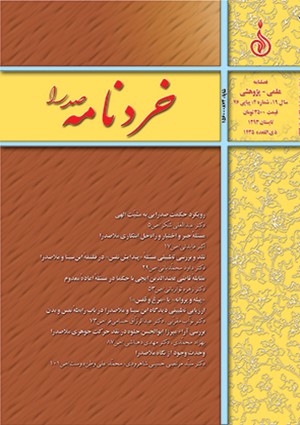بررسي آراء ميرزا ابوالحسن جلوه در نقد حركت جوهري ملاصدرا
محورهای موضوعی :بهزاد محمّدي 1 , مهدي دهباشي 2
1 - دانشگاه آزاد اسلامي
2 - دانشگاه اصفهان
کلید واژه: حركت جوهري اصالت وجود ابنسينا ملاصدرا حكيم جلوه ,
چکیده مقاله :
حركت جوهري كه برآمده از مباني فلسفي ويژة حكمت متعاليه است، يكي از اساسيترين نظريههاي بديع در تاريخ فلسفة اسلامي است كه توانسته بسياري از معضلات و ابهامات فلسفي را حل نمايد. اما حكيم ميرزا ابوالحسن جلوه انتقاداتي بر اين نظريه وارد كرده است كه مهمترين آنها عبارتند از: بازگشت همة تغيرها در جهان به حركت وضعي فلك، اعتقاد به كون و فساد آني حركات در جهان، نياز حركت جوهري به موضوع ثابت و انقلاب ماهيت در صورت پذيرش حركت جوهري. در اين مقاله اين انتقادات هم بلحاظ مبنايي و هم بلحاظ تبيين و استدلال مورد بحث و بررسي قرار گرفته است. يافتههاي مقاله نشان ميدهد كه حكيم جلوه با نگاه مشائي و غفلت از اصول اساسي فلسفة ملاصدرا، اين انتقادات را مطرح نموده است و همچون شيخالرئيس در همه» اشكالاتي كه بر حركت جوهري وارد كرده، بين احكام وجود و احكام ماهيت خلط نموده است.
Mulla Sadra’s trans-substantial motion, which is rooted in the specific philosophical principles of the Transcendent Philosophy, is one of the most fundamental innovative theories in the history of Islamic philosophy, which has succeeded in solving several philosophical complexities and ambiguities. However, Mirza Abulhassan Jilwah has advanced some criticisms against this theory, the most important of which include the return of all changes in the world to earth’s rotation, instantaneous generation and corruption of motions in the world, the dependence of the trans-substantial motion on a fixed subject, and essential transformation in case of accepting the trans-substantial motion. This paper explores and discusses these criticisms in terms of their principles and methods of reasoning. It concludes that Jilwah has advanced these criticisms based on a peripatetic approach, without referring to the fundamental principles of Mulla Sadra’s philosophy. In fact, like Ibn Sina, in all of his criticisms of the trans-substantial motion, he has confused the principles of existence with those of quiddity.
ابنسينا، حسين بن عبدالله، الطبيعيات الشفاء، تقديم ابراهيم مدكور، قم، كتابخانة آيتالله مرعشي نجفي، 1404ق.#
آشتياني، سيدجلالالدين، شرح حال و آراي فلسفي ملاصدرا، قم، حوزة علميه، 1380.#
پاپكين، ريچارد و آورم استرول، كليات فلسفه، ترجمة سيدجلالالدين مجتبوي، تهران، حكمت، 1374.#
دهباشي، مهدي، پژوهشي تطبيقي در هستيشناسي و شناختشناسي ملاصدرا و وايتهد، تهران، نشر علم، 1386.#
رضازاده، حسن، مجموعه آثار حكيم جلوه، تهران، حكمت، 1385.#
ملاصدرا، الحكمة المتعاليه في الأسفار العقلية الأربعه، ج1: تصحيح، تحقيق و مقدمة غلامرضا اعواني، تهران، بنياد حكمت اسلامي صدرا، 1383.#
ملاصدرا،الحكمة المتعاليه في الأسفار العقلية الأربعه، ج3: تصحيح، تحقيق و مقدمة مقصود محمدي، تهران، بنياد حكمت اسلامي صدرا، 1383.#
ملاصدرا، الحكمة المتعاليه في الأسفار العقلية الأربعه، ج4: تصحيح، تحقيق و مقدمة مقصود محمدي، تهران، بنياد حكمت اسلامي صدرا، 1383.#
ملاصدرا، الشواهد الربوبيه في المناهج السلوكيه، تصحيح، تحقيق و مقدمة سيدمصطفي محقق داماد، تهران، بنياد حكمت اسلامي صدرا، 1382.#
ملاصدرا، رسالة في الحدوث، تصحيح، تحقيق و مقدمة سيدحسين موسويان، تهران، بنياد حكمت اسلامي صدرا، 1378.#
ملاصدرا، عرشيه، تصحيح و ترجمة غلامحسين آهني، تهران، مولي، 1361.#
عبوديت، عبدالرسول، درآمدي به نظام حكمت صدرايي، تهران، سمت، 1388.#
فيض كاشاني، ملامحسن، اصولالمعارف، تصحيح، تعليق و مقدمه سيدجلالالدين آشتياني، قم، دفتر تبليغات اسلامي، 1375.#
كاپلستون، فردريك، تاريخ فلسفه، ج1: ترجمة سيدجلالالدين مجتبوي، تهران، علمي و فرهنگي، 1362.#
مصباح يزدي، محمدتقي، آموزش فلسفه، قم، نشر بين الملل، 1386.#
مطهري، مرتضي، مجموعه آثار، تهران، صدرا، 1389.#
ممدوحي، حسن، «معرفي، تبيين و ترجمة رساله حركت در جوهر حكيم جلوه زوارهاي»، گلشن جلوه؛ در تجليل از مقام علمي نامدار عرصة انديشه، حكيم الهي سيد ابوالحسن جلوه، به اهتمام غلامرضا گلي زواره، قم، قيام، 1375.#


